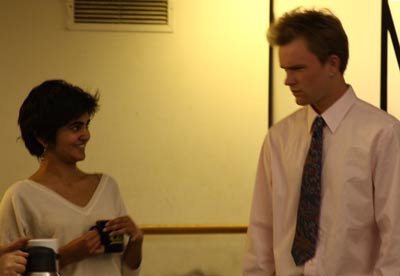Sexual-harassment training for supervisors
Training in how to deal with 'sticky situations' on the job is mandatory in 2009
| 18 February 2009
 Performers from the Interactive Theater Project act out a sexual-harassment scenario in which an openly gay character, right, is made to feel uncomfortable when a co-worker pressures him to go out after work in pursuit of "hot guys." (Andrea Gutierrez photo)
Performers from the Interactive Theater Project act out a sexual-harassment scenario in which an openly gay character, right, is made to feel uncomfortable when a co-worker pressures him to go out after work in pursuit of "hot guys." (Andrea Gutierrez photo)Every two years, the Berkeley campus begins a cycle of training in sexual-harassment prevention for supervisors. This year is one of those years.
California’s Harassment Training and Education Law — more commonly called Assembly Bill 1825 Regulations or simply AB 1825 — mandates that employers with more than 50 employees provide training in sexual-harassment prevention to supervisors every two years. At Berkeley, that category includes faculty and lecturers in addition to supervisory employees in administrative and academic units. (Because most faculty direct the work of graduate-student assistants or researchers, all faculty are required to take the training.)
The deadline is not far off: Supervisors have until May 15 to complete the two-hour requirement. The campus offers several ways to help them do so — via online training, taking an instructor-led workshop, or attending a performance of the AB 1825 Interactive Theater Program. The first two options are offered by the UC Office of the President; the third is newer, and homegrown. “We recognize our faculty and supervisors want a variety of options,” says Maria Padilla, manager of compliance education in the office of the vice provost for Campus Climate and Compliance (CCAC).
Training of your choosing
The first — and perhaps most convenient — option for supervisors is to take UCOP’s online-education program from the comfort of their desks. The much-improved online training module provided to the campuses by UCOP this year has been revamped to address technical problems some users experienced in 2007.
If spending another two hours at your desk doesn’t meet your needs, attendance at an instructor-led workshop will also satisfy the training requirement. In the workshop, Padilla discusses the myriad definitions of sexual harassment, the differences between state law and institutional policy, and the challenges of working on a diverse campus. Berkeley is a place where people from four generations bring differing cultural perspectives to the issue of harassment, she points out, perspectives based not only on age differences but also on class or ethnicity. She also covers topics and concepts common to workplace sexual-harassment cases — power differentials, perceptions, “intent versus impact,” prohibitions against retaliation, and policies and sanctions addressing consensual relationships.
Padilla can shape a two-hour workshop to suit the needs of specific departments or units. “What the faculty in the social sciences might address looks different than what the skilled tradespeople in Academic Facilities encounter day to day,” she says.
Curtain up on option three
The third and newest way to fulfill the AB 1825 requirement is by attending a performance of the campus’s Interactive Theater Program (ITP), a collaboration of CCAC; the vice chancellor for Equity and Inclusion; the Department of Theater, Dance, and Performance Studies; and Staff EEO Compliance. The ITP performers, all Berkeley staff and students, act out examples of sexual harassment in the workplace — then, still in character, they take questions from the audience about the scenarios. The exercise is intended to help the audience see each situation’s nuances.
Campus Climate and Compliance rolled out a pilot version of the ITP workshop last fall. Gary Firestone, professor of molecular and cell biology, participated in a session, then enthused about the experience in an e-mail to Padilla: “There is no doubt in my mind that … I learned much more about the issue — and in a particularly engaging way — than anything I would have learned from the online session.”
The bottom line: Ask for help
If supervisors take away one key lesson from their training this year, what should it be? Assistant Vice Provost for CCAC Nancy Chu is clear on that one: All sexual-harassment issues are best handled with her help. If a supervisor receives a report or inquiry about possible sexual harassment, the best move is to contact her rather than try to address the issue alone, or with the assistance of colleagues.
“A situation can become more complicated when departments try to resolve sticky situations in isolation,” says Chu. “We encourage people to work with our office — to let us walk them through the steps while providing guidance consistent with university policies.”
In fact, says Chu, her office gets more calls following a cycle of managerial training than at any other time — one sign that raising awareness through training can pay off in the real world
Next steps for managers
To take the sexual-harassment-prevention online course, access the personalized link sent to your campus e-mail address last month by the Office of the President Learning Center. E-mail questions to uclearningcenter@ucop.edu.
Campus Climate and Compliance has scheduled monthly instructor-led workshops, and participants should sign up at hrweb.berkeley.edu/ice/home. Presentations will be held in 150 University Hall and other locations across campus.
To arrange an instructor-led workshop tailored to your department or unit, or to learn more about upcoming Interactive Theater Program performances that will satisfy the AB 1825 requirement, contact Maria Padilla at 643-9707.
Department chairs and managers may also contact Padilla to request a performance of the AB 1825 ITP workshop. Performances will be scheduled throughout this semester. Announcements will be sent to departments specifying dates and times.

